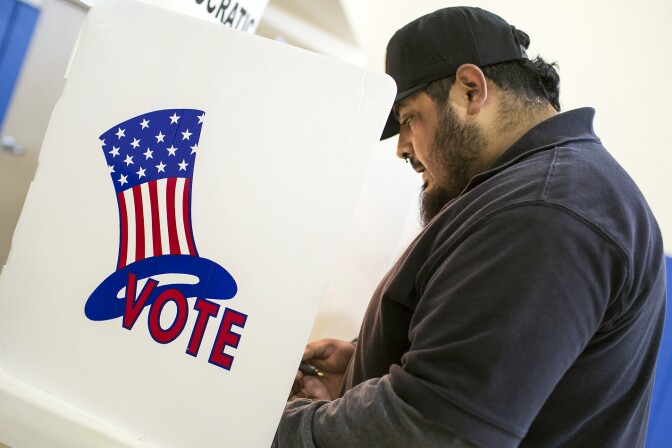This story is free to read because readers choose to support LAist. If you find value in independent local reporting, make a donation to power our newsroom today.
This archival content was originally written for and published on KPCC.org. Keep in mind that links and images may no longer work — and references may be outdated.
Voters don't like California's move to voting centers in place of neighborhood polling places

A new study finds that a majority of voters surveyed don't support a move to consolidate locations where people can cast ballots, a cornerstone of an elections overhaul law rolling out starting next year in California.
The University of California, Davis study to be published in full in a few days found 61 percent of Californians do not like the idea of voting centers replacing their neighborhood polling places.
“Change can be difficult or it can be confusing, right, whether it’s big or small,” said researcher Mindy Romero of UC Davis' California Civic Engagement Project, who conducted the study.
Under the new law known as the Voter's Choice Act (or VCA), counties statewide have the option to adopt a new voting system that would eliminate thousands of neighborhood polling locations across the state and replace them with the voting centers scattered throughout each county.
The centers would open for up to 10 days prior to election day. They would give voters more flexibility to vote at any center in their county and the centers would offer services like same-day voter registration — and save the counties money. But some critics say the change from local polling locations to voter centers may be too disruptive and confuse voters.
Los Angeles County, which recently has recorded some of the lowest voter turnout rates in the state, is planning to roll out the vote centers beginning in 2020.
In June, the Orange County Board of Supervisors voted against adopting vote centers, a move that surprised some election watchers and disappointed Secretary of State Alex Padilla, who has supported the elections overhaul.
Padilla said when he first heard of the voting centers, he was skeptical, too, but now he's a believer.
"I think that there’s so many more reforms and voter conveniences that are built into it ... that the voters of Los Angeles, the voters of California are going to love it," he said.
The UC Davis study found that voters who currently vote using mail ballots instead of at neighborhood polling places preferred the vote centers in greater numbers, although a majority still rated the centers unfavorably. Fifty-three percent of voters who vote by mail said they do not like the idea of voting centers versus 71 percent of polling place voters.
The study also found significant demographic differences. As a group, African Americans showed the most dislike for voting centers with 72 percent opposed followed by 65 percent of whites who don't like the idea.
The researchers made several recommendations to election officials following the study. Among them: sustained education efforts will be critical if voters are to accept the changes and not be discouraged from casting ballots.
In most places around the state, every voter will get a ballot in the mail under the new system. But that won’t be the case in L.A. County. During the initial rollout, permanent vote-by-mail voters or those who request mail ballots will get them, but most other voters will not.
"I am optimistic, from the standpoint that the traditional model of voting on a single day between a fixed set of hours at a single location is not consistent with the way the public conducts their business on a day-to-day basis," said Dean Logan, L.A. County's registrar. "I don't think the research raises concerns."
Logan said the L.A. County Board of Supervisors will likely take up formal adoption of the voting changes in late 2018.
The statewide survey covered 1,100 California voters and was conducted in English and Spanish. The margin of error was +/- 2.9 percent.
In 2013, Colorado overhauled its voting system and created voting centers similar to those on the horizon for California. Early research from The Pew Charitable Trusts found the change decreased costs in some cases by about 40 percent and dramatically reduced the need for provisional ballots.








